DRACULA Has Risen From the Grave…Again
The Original Vampire is back. No, I’m not talking about Christopher Lee in the 1968 classic Dracula Has Risen from the Grave. This time, Vlad Tepes Dracula has risen in a most unexpected and delightful place. Television.
Last Friday, just in time for Halloween, NBC aired the pilot of its new limited series Dracula, starring the great Jonathan Rhys Meyers. The show is a “re-imagining” of the original Bram Stoker novel and is supervised by show runner/head writer Daniel Knauf (HBO’s Carnevale). Currently, it is set to run as 10 episodes seeped in blood, romance, and horror, driven by the vampiric charisma of Ryhs Meyers. He stole the show in the BBC’s legendary Gormenghast mini-series, but is perhaps best known for his award-winning role as Henry VIII on Showtime’s The Tudors.
So, is this new incarnation of Dracula any good? The pilot episode is immediately engaging, with its crypt-raiding, blood-soaked resurrection, its turn-of-the-century London, and its decadent world of aristocracy and privilege. The classic story of DRACULA is entirely familiar, so the producers/writers have gone out of their way to put interesting twists in the story and freshen up the legend. New blood indeed.
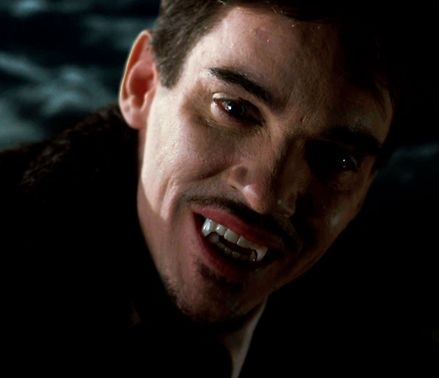 In the first of several clever twists, Dracula isn’t really the villain in this story. Perhaps it’s a sign of the times–our modern culture tends to worship the outlaw, venerate the villain, and glorify the gangster. TV has been moving this way ever since The Sopranos changed television with its shades-of-grey morality and fascinating criminal protagonists. So the trick here is to make Dracula a sympathetic lead without completely stripping him of his “monster” status and thereby turning him into a “sparkly vampire” a la Twilight. Fortunately, the producers of Dracula manage to pull off this feat in a skillful manner. This Dracula is hungry for some bloody justice.
In the first of several clever twists, Dracula isn’t really the villain in this story. Perhaps it’s a sign of the times–our modern culture tends to worship the outlaw, venerate the villain, and glorify the gangster. TV has been moving this way ever since The Sopranos changed television with its shades-of-grey morality and fascinating criminal protagonists. So the trick here is to make Dracula a sympathetic lead without completely stripping him of his “monster” status and thereby turning him into a “sparkly vampire” a la Twilight. Fortunately, the producers of Dracula manage to pull off this feat in a skillful manner. This Dracula is hungry for some bloody justice.
Dracula (posing as an American industrialist in London) is out to annihilate the Order of the Dragon, a secret society of elitist conquerors who have always hidden behind the Cross (i.e. Christianity). He assembles a “list” of modern-day members, accusing them of murder, rape, torture, and the wholesale slaughter of innocents. Ironic that a man remembered by history as “Vlad the Impaler” would be so against these savage practices.
Yet perhaps it was this Order of the Dragon who framed Vlad as a mass-murdering tyrant? That remains to be seen in this particular version. However, the idea of evil potentates masquerading behind Christian values is not a new concept and it rings refreshingly true. Anyone remember the horrors of the Crusades? Entire cities put to the torch by rapacious, baby-killing Templars? Diabolic slaughter in the name of the Church? No wonder Vlad hates the Cross. A sliver of flashback reveals Dracula’s vendetta against Christianity–or at least the Order of the Dragon that hides behind it like a shield.
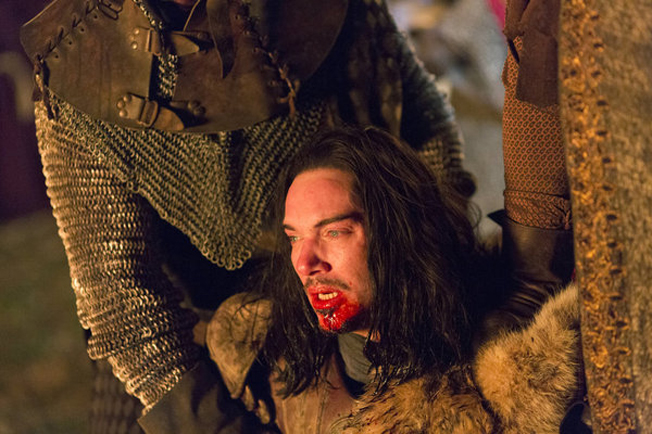 The Order slaughtered Vlad’s beloved wife generations earlier–not to mention had him entombed in a crypt until a mysterious tomb-raider brought him fresh blood to stir him from death-sleep. The identity of that mysterious tomb-raider is revealed at the end of the first episode, and it’s NOT who you would have expected. Another clever twist, which reveals a clandestine alliance unlike any we’ve seen before in the Dracula mythos.
The Order slaughtered Vlad’s beloved wife generations earlier–not to mention had him entombed in a crypt until a mysterious tomb-raider brought him fresh blood to stir him from death-sleep. The identity of that mysterious tomb-raider is revealed at the end of the first episode, and it’s NOT who you would have expected. Another clever twist, which reveals a clandestine alliance unlike any we’ve seen before in the Dracula mythos.
In the pilot, we also get the “fatal attraction” of Dracula to Mina Murray (played by the lovely Jessica De Gouw). Yet in this version, Mina is no hapless debutante–she is a promising medical student under the supervision of none other than Dr. Van Helsing. Yes, THAT Van Helsing. However, it’s a different vampire-hunter who faces down Dracula in a rooftop battle here: a German named Kruger, who recognizes the true identity of “Alexander Grayson” (Dracula’s alias). Kruger has obvious ties to the Order of the Dragon. It appears these vampire-hunters may not be heroes at all, but merely agents of a hidden order that seeks to dominate civilization.
Also of interest is the diversity of casting here, as exemplified by an African-American Renfield, Dracula’s traditional servant (played eloquently by Nonso Anozie). However, in this version, Renfield appears to be more of a confidant and consigliere than a whimpering slave. This makes him a far more believable character and provides a new view of Dracula himself. The Lord of Vampires actually has a mortal friend and co-conspirator? Now that’s interesting.
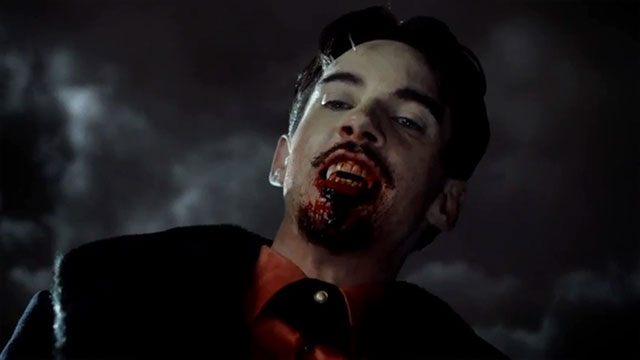 What’s more, Dracula appears to be part Nikola Tesla in this incarnation, bringing a heretofore unknown source of electro-magnetic energy to London, ostensibly to find European investors, but in reality to expose and defy the Order of the Dragon, who have basically conquered the world with their petroleum interests. Yes, the bad guys Dracula is out to destroy are ruthless, conniving oilmen. How poignant. This is definitely a 21st century take on the classic 19th-century tale. Drac feeds on red blood; his enemies feed on black petroleum. A clash of monsters is in the works.
What’s more, Dracula appears to be part Nikola Tesla in this incarnation, bringing a heretofore unknown source of electro-magnetic energy to London, ostensibly to find European investors, but in reality to expose and defy the Order of the Dragon, who have basically conquered the world with their petroleum interests. Yes, the bad guys Dracula is out to destroy are ruthless, conniving oilmen. How poignant. This is definitely a 21st century take on the classic 19th-century tale. Drac feeds on red blood; his enemies feed on black petroleum. A clash of monsters is in the works.
Dracula features great set designs, great costuming, and solid acting all around. Rhys Meyers is impeccable as Dracula–the only thing missing is his charming accent, as he’s impersonating an American during the entire episode. However, his sheer gravitas, handsome demeanor, and vicious nature perfectly captures the young Dracula who is (literally) Hell-bent on revenge. This Drac also has a bitchin’ bone-handle sword, and he knows how to use it.
I’ve seen some negative online reviews in passing, but these days everyone likes to tear down genre shows. It’s become a sport. So allow me to stand up and say “Bravo!” to NBC for taking a chance on this slick and fascinating new version of the Dracula mythos. It’s got a lot going for it and the first among them is a redefined title character brought to life by an actor who was born to play the role.
You might think a network show would shy away from blood, but there is plenty of it spilled in the Dracula pilot, and bound to be plenty more before the series is over. We’re also bound to find out more about Vlad’s history with the Order of the Dragon, and his immortal love for Mina Murray. Then there’s that pesky Jonathan Harker snooping around, digging for a news story that will elevate his career. There’s a vampire girl kept in a cage, and a sexy vampire-hunter who is destined to cross paths with Vlad sooner than later.
DRACULA is bloody good fun–a celebration of atmospheric pulp adventure.
Tune in on Friday nights and drink deep…
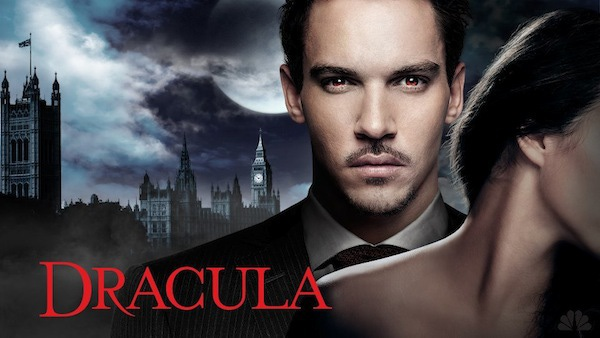
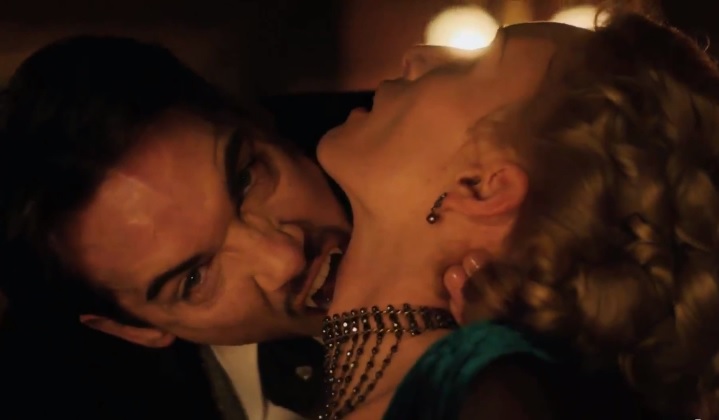
“However, the idea of evil potentates masquerading behind Christian values is not a new concept, and it rings refreshingly true.”
http://www.religioustolerance.org/imm_bibl.htm#menu
http://www.religioustolerance.org/god_cana.htm
The conquest of Canaan, in which God ordered the Hebrews to completely exterminate the Canaanite people — again from the elderly to newborns and fetuses. This is described throughout the book of Joshua as occurring in Jericho and other Caananite cities.
The first three of the above genocides have at least three factors in common:
bullet The Bible explains that God was primarily responsible.
Jewish and Christian conservatives generally believe in that the authors of the Bible were inspired by God and thus their writings are inerrant. They believe that the genocides *happened exactly as described in the Bible*.
In addition, the book of Revelation, as interpreted by Christian Dispensationalists, predicts that a *massive genocide will occur* at some time in our future, in association with the war of Armageddon and the end of the world as we know it (TEOTWAWKI). If it were to happen in the near future, on the order of *two billion people will die*.
It’s really sad how often religion–any religion–is used as an excuse for atrocities. From Christian Crusades to Islamic Extremists, history is full of such terrors. It’s interesting that this new incarnation of Dracula brings up such issues and contrasts them against the fictional evil of the vampire…
Mr. Fultz, did you read the first comment? Did the Biblical Moses and other prophets simply pretend to have received those directives? Should we not then denounce such mountebanks? Should we not reassess those people who admired them as goodhearted bumpkins?
PB210: I’m sure Dracula would agree with you. As for me, I’m not trying to denounce anyone, I’m simply reviewing a TV show and a clever twist in a classic, well-known story. But for the record, I am of course firmly AGAINST genocide, hypocrisy, and zealotry.
The premiere was interesting, but underwhelming for me. For a Dracula story, there was a significant lack of suspense or horror. Jonathan Rhys Meyers is a good Dracula, but the vampire as sympathetic protagonist shtick is getting old. The shuffling of character and story elements weren’t particularly compelling and I found myself wondering why they didn’t just make an original Dracula story, like the Hammer Dracula sequels.
As far as the Order of the Dragon, I was a bit confused. On the one hand, they’re a bunch of evil, wealthy (synonymous, of course) industrialists looking out for their own interests. On the other hand, they’re protecting mankind from creatures like vampires. So which is it? Or are they concerned about the undead solely for the potential threat to their interests? Were the White Chapel killings a threat to their interests? Can they be all bad if they are trying to protect people from vampires?
As far as your review, John, I’m not sure I understood this sentence: “However, the idea of evil potentates masquerading behind Christian values is not a new concept, and it rings refreshingly true.”
It’s not a new concept, but it rings refreshingly true? I agree with the first part your assertion, which is why I didn’t find it refreshing, much less original.
And then this: “Anyone remember the horrors of the Crusades? Entire cities put to the torch by rapacious, baby-killing Templars? Diabolic slaughter in the name of the church? No wonder Vlad hates the cross.”
If the idea of evil masquerading behind Christian values is not new, why did you feel compelled to justify the writer’s choice with a litany of Church abuses? Does Vlad hate the cross (or the Order) because of what was done during the Crusades? I didn’t get that. He seemed preoccupied with taking vengeance for the crimes committed against him by the Order. This would seem to be supported by the fact that Dracula’s hatred was not mitigated by the contemporary Order’s apparent lack of Christian identity.
On a side note, I would be curious to know when Templars burned cities or killed babies. Not trying to start an argument. It’s just that I’ve read a little about the Crusades and never come across such an account. And for the sake of context, it should be noted that the “diabolic slaughter” in the name of the Church during the Crusades was standard for any army, religiously motivated or otherwise, against any city that resisted siege going back to the ancient world. Latins and Muslims understood that inhabitants of a besieged city who refused to capitulate could expect all the men to be put to the sword, while the women and children were enslaved. Not defending it, just offering context.TB
Thanks for your comments, Jake.
First, “I found myself wondering why they didn’t just make an original Dracula story, like the Hammer Dracula sequels.”
Because it’s BEEN DONE. This is a fresh take on Dracula, which is what my entire review was based on. Some people may not like it, but I also love the Hammer Films, and the Francis Ford Coppola version.
Secondly, your questions about the Order are right on the money. Are they truly evil, or is Vlad simply justifying his own lust for revenge? This remains to be seen. Shades of gray, as I mentioned. Are the Order just as evil as Dracula, or are they being cast as “evil” because of what they did to him? These are compelling questions, and they go beyond the simple (and often boring) “Good vs. Evil” paradigm.
Thirdly, when I said “However, the idea of evil potentates masquerading behind Christian values is not a new concept, and it rings refreshingly true…” I was referring to this type of characterization on a TELEVISION SHOW. You don’t normally get such a skewed view of Christianity (even Ancient Christianity) on a TV show, let alone a NETWORK TV show. So it’s refreshing to see a TV show that allows its writers to explore the “gray areas” of history and look at the “Christian” Order of the Dragon through Dracula’s eyes–whether his view of them is true or false. Normally on TV the Christians are the “good guys.” TV rarely takes chances on potentially controversial storylines, and this is one of those times. Refreshing.
Fourth, you ask “Does Vlad hate the cross (or the Order) because of what was done during the Crusades?” Perhaps! I don’t know exactly when his beloved wife was tortured and killed by the Order–did that happen during the Crusades? My comment was merely to provide some historical precedent for this particular religion being used as an excuse for cruelty and evil behavior in the past. I could have mentioned the Spanish Inquisition as well. Or the Salem witch-burning trials. The Crusades were as good as any other example.
Lastly, I definitely understand that “back in the day” (the ancient world), people knew well the rules of warfare and that besieged cities were going to be slaughtered, raped, and tortured. We see this same kind of horrible results in today’s wars. War is war, and it’s always horrible. But just because slaughtering innocents was “they way things were done” does NOT excuse the Christian knights who did those terrible, inhuman things. Just because it’s accepted by society and those in power, does NOT mean it’s okay with the principles of Christ–which is what Christianity, afterall, is based on. Christ said “turn the other cheek” and “love your enemy”, not “when you conquer a city be sure to put all the men, women and children to the sword.” Such hypocrisy has always existed and it’s always been WRONG. No matter if it was done in the name of “God” or not. The slaughter of innocents is always “diabolic”, and I stand by that word. The problem with Christianity begins when Christians don’t match their actions with their beliefs.
So my comments about the crimes committed by “the Church” were made to give Vlad’s grudge and lust for vengeance some context. In this new version of Dracula, he seems not to hate the Christ, but those who hide behind his name to serve their own personal glory.
Is the Order of the Dragon wholly evil as Drac says? That remains to be seen, and it is one of the reasons I will keep watching.
Thanks for the clarifications, John.
As to you first point, it seems to me, that what’s “been done” is a whole lot of Dracula remakes. I’m not a stickler for adhering to every detail of the original story, but if you’re going to rewrite/re-imagine it so completely, why not write an original story where there are no constraints or expectations? The last Hammer Dracula film was released in the early 70s. And I’m pretty sure we can do better than Dracula 2000.
As to the idea that Dracula is refreshing because network TV shows aren’t normally critical of Christianity, I really don’t know where you get that idea. Television does indeed sometimes depict Christianity and Christians in a positive light. But I’ve also watched TV shows that mock Christians, or certain types of Christians, portraying them as ignorant, angry, hypocritical, judgmental or zealots. Which is fine, by the way. I just don’t find it original.
The premiere was interesting enough to warrant watching at least the next episode. I’m a fan of the Dracula mythos, so I’m always intrigued by different visions of it. I’m just not sure this version is in any way true to the core thematic elements of the original. It may in fact be hostile to them.
“Just because it’s accepted by society and those in power, does NOT mean it’s okay with the principles of Christ–which is what Christianity, afterall, is based on”.
Actually, some would say that the teachings of Paul (who does not seem to often come up in film and television, despite the impact his writings have on seminaries) sway matters more. I find it amusing that in film and television depictions of Heaven this rarely comes up with Constantine (2005) as an exception (since that film does acknowledge the historical importance Pauline theology places on faith for salvation).
“Christ said “turn the other cheek” and “love your enemy”, not “when you conquer a city be sure to put all the men, women and children to the sword.”
Luke 19:27 But those enemies of mine who did not want me to …
But those mine enemies, which would not that I should reign over them, bring hither, and slay them before me.
I can’t buy into the idea of Christianity as a religion that endorses violence. You can take the Bible (a book that was written over hundreds of years by separate individuals with their own voices, ideas, and prejudices) and use it to back up anything. People do this all the time. It’s one reason there are so MANY different versions of Christianity–rather than a single, monolithic religion. Those who read violence into their Christianity are missing the whole point of it. As are those who take the Bible as the “literal word of God.” Of course, this is all simply one man’s (informed) opinion–others may disagree with me. However, nobody can deny that Christianity–LIKE EVERY RELIGION EVERY INVENTED–has been used to control, persuade, and rule over people. It’s also been used as an excuse for horrible crimes against humanity. I wrote a review of a fresh take on Dracula–I’m not here to defend–or attack–the Christian religion. It suffers from the same weaknesses as all other religions, and there’s always somebody there willing to exploit that weakness for their own glory. Paul and Luke may have wanted to split some heads and kill some non-Christians. But I (personally) will never believe that’s what Christ himself wanted, or preached.
[…] as Count Dracula in the 1931 Universal film, and John R. Fultz looked at NBC’s new series Dracula.) Same with Sherlock Holmes (see the trailer for Season Three of BBC One’s adaptation here), […]